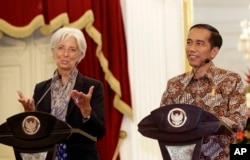Volatility in China’s stock market on Tuesday and the release of manufacturing data is raising more concerns about the outlook for the Chinese economy, even as officials here insist the situation is under control.
Stock prices on the country’s main index in Shanghai plunged almost 5 percent shortly after opening on Tuesday. A rocky round of trading followed, before the market closed down 1.2 percent.
Analysts said the release of more bad economic data weighed on shares. According to an official survey of factory activity, China’s manufacturing sector contracted at its fastest pace in three years.
A survey by Markit, which focuses on smaller private firms, showed activity at factories at the weakest performance level in six and a half years.
China is not the only country in Asia that is seeing slower manufacturing activity, but it is the world’s second largest economy. And as its struggles to ween away from an over-reliance on exports and push forward with long overdue reforms, it is having a ripple effect on the global economy, shaking up global markets and commodity prices.
Bumpy ride
The developments have been so significant, that Japan’s finance minister Taro Aso suggested on Tuesday that the Chinese economy be a focus of this week’s meeting of the Group of 20 major economies.
Aso said that instead of being swayed by superficial market moves, he believes it’s important to understand the structural issues behind what is going on in China.
“I think it’s beneficial to hold a frank debate at G20 on what is happening in the Chinese economy,” he said.
During a visit to Indonesia on Tuesday, International Monetary Fund Director Christine Lagarde urged emerging economies to be vigilant for spillovers from China’s slowdown.
Lagarde said that while China’s slowdown was not sharp or unexpected, it is adjusting to a new growth model.
"The transition to a more market-based economy and the unwinding of risks built up in recent years is complex and could well be somewhat bumpy," she said.
An official at China’s National Development and Reform Commission, the country’s top economic planning agency, assured Tuesday that the stock market volatility was contained and that the country could withstand as it pushes forward with market reforms.
Sentiment sinking
China has unleashed a flood of measures to defend the index, but despite that effort, the market has continued to fall. China’s main index in Shanghai is down about 40 percent since mid-June.
For many who watch the market, it is hard to tell just how low the index could go.
"For now, no one can say for sure if the markets have hit rock bottom," said Lu Suiqi, an associate professor of economics at Peking University.
New measures announced by the government on Tuesday, including policies to support mergers and acquisitions, cash dividends and share buy-backs by listed state-owned companies did little to boost sentiment.
Critics add that such reforms are a dead end when it comes to the long-term health of the Chinese economy.
"If [policy-makers in] China continue the mindset of making state-owned enterprises bigger and stronger, such state-owned enterprises will still be short of efficiency and a fair play,” said Hu Xingdou, an economics professor at Beijing University of Technology.
What is more important is to attract more private investment and encourage the privatization of state-owned enterprises, he said.
Hu said efforts to prop up the market, particularly in the run-up to this week’s massive military parade in Beijing, can only fuel unrealistic expectations among investors for a government bailout. It also violates free market mechanisms, he said.
"Between the government [intervention] and the market [reform], China on the one hand allows market [forces] to prevail, but on the other hand, it has overdone it when it comes to intervention," Hu said.
Liao Qun, chief economist at China CITIC Bank says that while the Chinese economy is doing poor in manufacturing, services continue to do better than anticipated. He believes it will still take some time for the economy to rebound.
“In the short term, the government still needs to expand its pace of monetary easing and the use of fiscal stimulus to help stabilize demand,” Liao said.
Growth forecasts cut
The turmoil in China’s stock market and devaluation of its currency has led economists at Goldman Sachs to slash their forecasts for China for the next three years, saying that by 2018 China’s economic growth is expected to slow to 5.8 percent.
Goldman Sachs expects growth of 6.4 percent and 6.1 percent for China in 2016 and 2017.
According to Reuters news agency, economists at ANZ are also rethinking their forecasts. Economists said that based on the manufacturing data released Tuesday, they expect China’s economy to grow by 6.4 percent in the third quarter but to rebound with policy support to 6.8 percent in the fourth and last quarter of the year.






